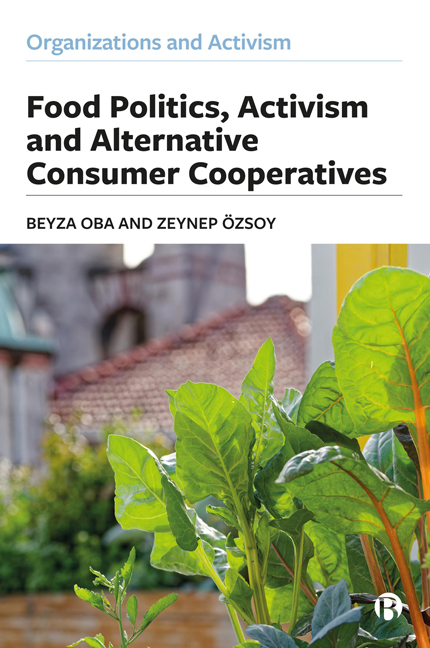Book contents
- Frontmatter
- Contents
- Series Editors’ Preface
- 1 Introduction: Experimenting with Direct Democracy
- 2 The Politics of Food: Alignment for Solidarity and Resistance
- 3 Against Neo-Liberalism and Authoritarianism: The Background to Food Politics in Turkey
- 4 The Political Economy of Consumer Cooperatives in Turkey
- 5 Alternative Consumer Cooperatives in the Making of a Public Sphere
- 6 Experimenting with an Alternative to the Capitalist Food Provisioning System
- 7 The Governance of Alternative Consumer Cooperatives
- 8 Instead of a Conclusion
- Notes
- References
- Index
6 - Experimenting with an Alternative to the Capitalist Food Provisioning System
Published online by Cambridge University Press: 27 March 2024
- Frontmatter
- Contents
- Series Editors’ Preface
- 1 Introduction: Experimenting with Direct Democracy
- 2 The Politics of Food: Alignment for Solidarity and Resistance
- 3 Against Neo-Liberalism and Authoritarianism: The Background to Food Politics in Turkey
- 4 The Political Economy of Consumer Cooperatives in Turkey
- 5 Alternative Consumer Cooperatives in the Making of a Public Sphere
- 6 Experimenting with an Alternative to the Capitalist Food Provisioning System
- 7 The Governance of Alternative Consumer Cooperatives
- 8 Instead of a Conclusion
- Notes
- References
- Index
Summary
Introduction
The impact of globalization and neo-liberal policies in Turkish agriculture has been marked by the subordination of the petty commodity producers to market forces and their displacement from land and farming tradition. After the 1980 structural adjustment programme, governments with legislative reforms withdrew subsidies, reduced price supports and privatized parastatal organizations which in turn compelled small producers of agricultural products to rely on their own resources in their struggle within local and international markets. The pervasive implementation of neo-liberal policies, especially after 2002, transformed both production and consumption in agriculture.
On the production side, with the increasing dominance of agro-food companies and the commodification of foodstuff, petty commodity producers were driven out of the market. According to the official data of the Social Security Institute (SGK), in the last twelve years the number of insured farmers has dropped by 48.6 per cent (see Figure 6.1) and, in the last eighteen years, the amount of arable land has decreased by 3.150 million hectares (Tuncer, 2019). Small farmers deprived of government subsidies became more reliant on bank loans for the provision of their seeds, pesticides and machinery. As explained by the president of Çiftçi-Sen (the Farmers’ Union), the petty commodity producers’ debts for agriculture to the banks and credit cooperatives increased 53 times between 2002 and 2020 (Çameli, 2021), while subsidies were reduced by 48 per cent. In this transformation process, as well as increases in input prices, petty commodity producers faced stiff competition from imported foodstuff. However, it is worth noting that, currently, due to foreign currency fluctuations and the Turkish lira losing its value drastically, lowering trade barriers does not work as a viable strategy. In such an economic and political milieu, the petty commodity producers are left with a choice between leaving their farm and/or negotiating contracts with the agro-food companies.
On the consumption side, after 1980, with the implementation of free-market operations and the deregulation of agriculture, a major transformation in the food industry took place; the number of foreign companies increased and major international food processors and retailers entered the Turkish market either as greenfield operations or as joint ventures with local big capital (Yenal, 1999; Atasoy, 2013; Değirmenci, 2021).
- Type
- Chapter
- Information
- Food Politics, Activism and Alternative Consumer Cooperatives , pp. 101 - 124Publisher: Bristol University PressPrint publication year: 2023

